Jun 30, 2022
WHY SLEEP IS IMPORTANT?

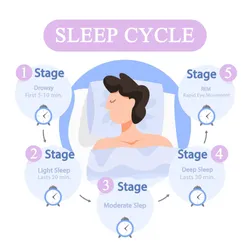
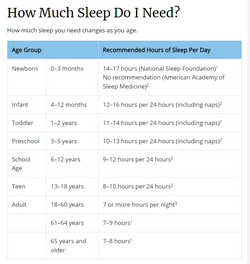
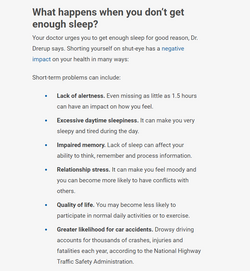
common sleep disorder

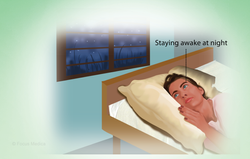
Transient insomnia - occurs when symptoms last up to three nights.
Acute insomnia - also called short-term insomnia. Symptoms persist for several weeks.
Chronic insomnia - this type lasts for months or sometimes years.
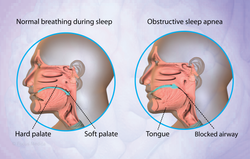
How to sleep better
If you’re experiencing mild, occasional problems with sleep, try these simple strategies from Dr. Drerup.
1. Treat getting enough sleep as if it is as important as taking medicine
With all the demands on our time every day, you might put a good night’s rest at the bottom of your priority list. But Dr. Drerup says we need to schedule adequate time for sleep.
“It’s very easy to stay up late and burn the candle at both ends,” she says. “However, when you do that, you quickly run into a problem of dealing with sleep deprivation.”
2. Keep a consistent wake time
Wake up at the same time every day, including weekends or days off. Waking at the same time every day actually helps you sleep better at night. A fixed wake time helps build a strong desire for sleep throughout wakefulness. This sleep drive gradually builds, and shortening it by sleeping in will make it harder to fall asleep the next night. Sleeping in on the weekend makes it much more difficult to wake up earlier on Monday morning.
It’s also important to do some relaxing activity, recommends Dr. Drerup, like taking a warm bath or reading a book before bedtime. By making these activities part of your bedtime ritual, you can train yourself to associate these activities with sleep. This association will help you move more easily into slumber.
3. Put away the smart phones and tablets
Electronic devices keep your mind humming — and far from the relaxed state you need to achieve before bedtime. Dr. Drerup advises it’s a good idea to put away devices like smart phones and tablets at least one hour before bedtime.
4. If you do wake up during the night, avoid looking at the clock
“The minute you look at that time it’s not just looking at one number,” Dr. Drerup says. “You start mental calculations, you think about how long it’s been since you’ve been in bed and what you have to do the next day. And before you know it, a long time has passed and that cuts into your sleep time.”
Make time for down time
“In our society, nowadays, people aren’t getting enough sleep. They put sleep so far down on their priority list because there are so many other things to do — family, personal stuff and work life,” Dr. Drerup notes. “These are challenges, but if people understand how important adequate sleep is, and how to sleep better, it makes a huge difference.”
How to sleep better
If you’re experiencing mild, occasional problems with sleep, try these simple strategies from Dr. Drerup.
1. Treat getting enough sleep as if it is as important as taking medicine
With all the demands on our time every day, you might put a good night’s rest at the bottom of your priority list. But Dr. Drerup says we need to schedule adequate time for sleep.
“It’s very easy to stay up late and burn the candle at both ends,” she says. “However, when you do that, you quickly run into a problem of dealing with sleep deprivation.”
2. Keep a consistent wake time
Wake up at the same time every day, including weekends or days off. Waking at the same time every day actually helps you sleep better at night. A fixed wake time helps build a strong desire for sleep throughout wakefulness. This sleep drive gradually builds, and shortening it by sleeping in will make it harder to fall asleep the next night. Sleeping in on the weekend makes it much more difficult to wake up earlier on Monday morning.
It’s also important to do some relaxing activity, recommends Dr. Drerup, like taking a warm bath or reading a book before bedtime. By making these activities part of your bedtime ritual, you can train yourself to associate these activities with sleep. This association will help you move more easily into slumber.
3. Put away the smart phones and tablets
Electronic devices keep your mind humming — and far from the relaxed state you need to achieve before bedtime. Dr. Drerup advises it’s a good idea to put away devices like smart phones and tablets at least one hour before bedtime.
4. If you do wake up during the night, avoid looking at the clock
“The minute you look at that time it’s not just looking at one number,” Dr. Drerup says. “You start mental calculations, you think about how long it’s been since you’ve been in bed and what you have to do the next day. And before you know it, a long time has passed and that cuts into your sleep time.”
Make time for down time
“In our society, nowadays, people aren’t getting enough sleep. They put sleep so far down on their priority list because there are so many other things to do — family, personal stuff and work life,” Dr. Drerup notes. “These are challenges, but if people understand how important adequate sleep is, and how to sleep better, it makes a huge difference.”
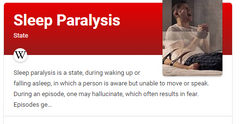

What You Should Know About Sleep Paralysis and ‘Sleep Demons’
night·mare
[ˈnītˌmer]
NOUN
a frightening or unpleasant dream:
pa·ral·y·sis
[pəˈraləsəs]
NOUN
the loss of the ability to move (and sometimes to feel anything) in part or most of the body, typically as a result of illness, poison, or injury:

What are hallucinations and how do they happen?
Hallucinations are defined as the "perception of a nonexistent object or event" and "sensory experiences that are not caused by stimulation of the relevant sensory organs." In layman's terms, hallucinations involve hearing, seeing, feeling, smelling, or even tasting things that are not real.
Hallucinations during sleep paralysis fall into three categories:
Intruder hallucinations, which involve the perception of a dangerous person or presence in the room.
Chest pressure hallucinations, also called incubus hallucinations, that can incite a feeling of suffocation. These frequently occur along with intruder hallucinations.
Vestibular-motor (V-M) hallucinations, which can include feelings of movement (such as flying) or out-of-body sensations.
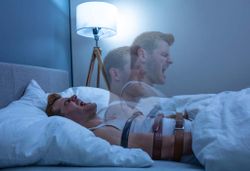
By undefined
20 notes ・ 35 views
English
Beginner